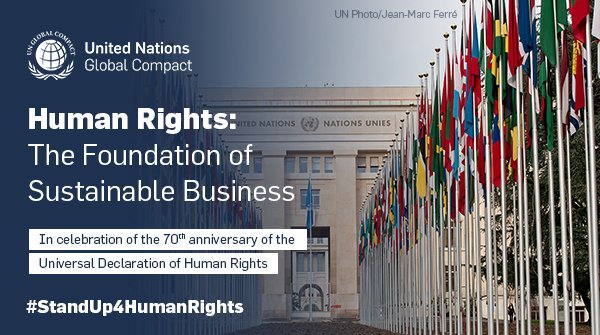
While the formation of the United Nations Global Compact in 2000 – the brainchild of the incomparable from UN Secretary General Kofi Annan initiated to “put a human face to the global market” – ushered in an unprecedented era of sustainable and socially responsible business codified in the universal Ten Principles around human rights, labour, environment and anti-corruption, business commitment and stewardship in human rights needs to be accelerated further to make meaningful impact.
Key to sustained corporate commitment to human rights has been consumer, employee, government and investor demands for responsible business. 66% of global consumers say they’re willing to pay more for products and services provided by companies that are committed to positive social and environmental impact; employee morale is reportedly 55% better while employee loyalty is 38% better in companies with strong sustainability programs; government policy makers – from Europe to Africa – are increasingly requiring both companies and investors to consider the environmental, social or governance (ESG) impact of their holdings; and responsible investment is a rapidly growing field.
For businesses, the main value proposition for commitment and stewardship of human rights has been creating “large-scale positive impact” in the communities they operate in, which will in turn generate long-term and sustainable profits for the business. More importantly, however, the responsibility to respect human rights is a global standard of expected conduct for all businesses wherever they operate, regardless of States’ ability and/or willingness to fulfill their own human rights obligations. A significant number of businesses have already subscribed to this paradigm shift, taking concerted actions to respect human rights and provide remedy when violations arise.
But as populism and authoritarianism are increasingly celebrated by many electorates, from Brazil to the Philippines, Hungary to the US, these consumer-employee-government-investor pressure points are being diminished to the extent of eroding the hard-worn progress in business commitment to human rights – which is more necessary now more than ever as much as it is still inadequate.
Will business retreat in cue to governments’ apparent retreat in human rights, or rise to the occasion and take leadership of this crucial issue?
While declining State commitment likely heralds a similarly uncertain future in corporate adherence to human rights, the business case for social responsibility remains as relevant today as it has ever been: public goods – equality, freedom, and well-being – are as much, if not more, in the private interest.
Observing and promoting human rights remains an important success criteria for any business, as there’s no more conducive an operating environment than an equal and just society.
Indeed, long-term business success is contingent on the elimination of poverty, discrimination, forced labour and overall human rights stewardship. Simply put, the more you promote human rights, the better your business is doing.
So on this 70th Anniversary of the Universal Declaration of Human Rights, there’s no better way for business to celebrate than with a strong recommitment to fundamental human rights, and to being a force for good. ###
